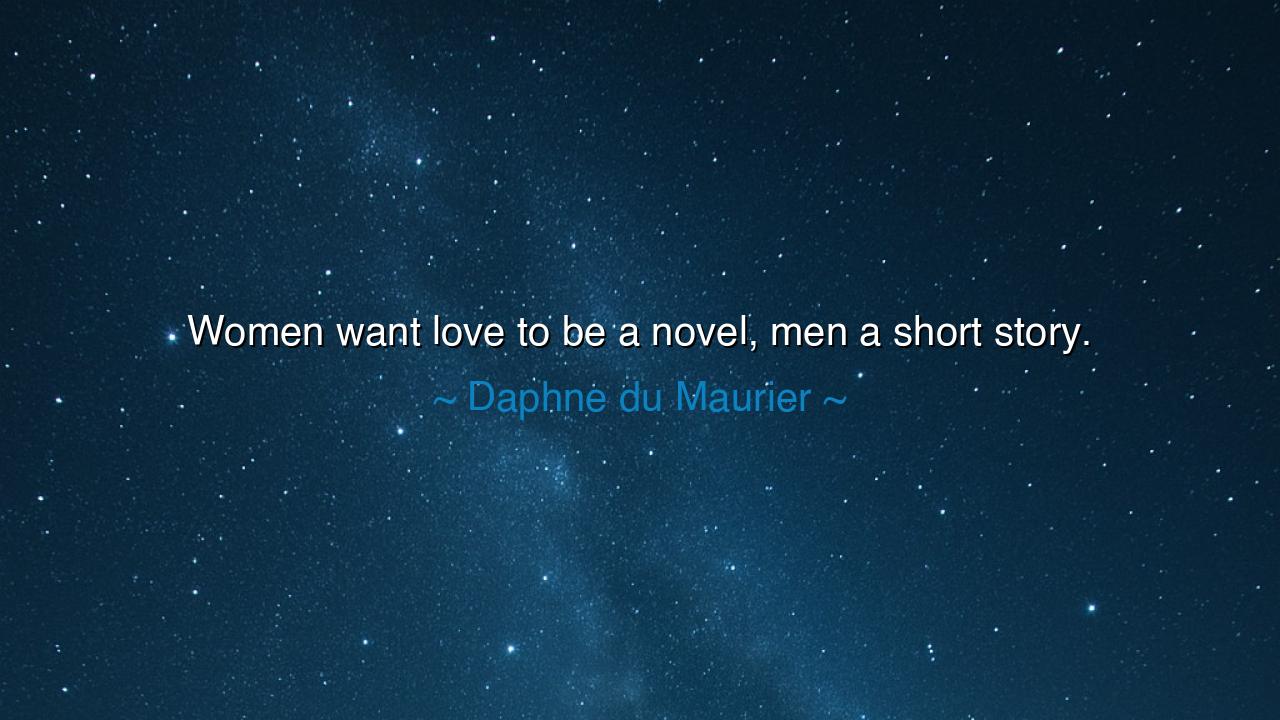
Women want love to be a novel, men a short story.






Listen, O children of wisdom, for the words of Daphne du Maurier, a keen observer of the human heart, offer us a profound reflection on the nature of love. She speaks thus: "Women want love to be a novel, men a short story." These words, though simple, carry with them the weight of a thousand years of human experience. Du Maurier speaks not just of romantic love but of the very nature of human relationships, of how men and women perceive love differently, how they long for different things in the dance between hearts.
Reflect, O wise ones, on the meaning of love as a novel. The novel, long a symbol of complexity, of depth, and of unfolding stories, mirrors the way many women view love. It is not something that can be contained in a single moment or a fleeting glance, but rather a journey—a story to be told over time, filled with layers, emotions, and experiences. For women, love is not a simple narrative but a grand, unfolding tale, one that requires patience, understanding, and the willingness to dive deep into the intricacies of the heart. It is a story where each chapter adds to the richness of the whole, where the smallest details—whether joy or sorrow—become part of the larger story of connection.
In contrast, men, as du Maurier suggests, often view love as a short story—brief, direct, and to the point. The short story is a compact creation, where the central idea is quickly realized and brought to a satisfying conclusion. For many men, love is about the moment—the initial spark, the intensity, the rush of emotions that come in a flash. It is less about the journey and more about the experience, the feelings that surge in the now. The difference lies not in the value of love, but in how it is experienced and understood. For men, love can be something that is immediate, something that does not require the slow unfolding of a long tale, but instead thrives in the present, in the consumed and the passionate.
Consider the great love stories of history, O children. Think of Cleopatra and Julius Caesar, whose love was marked by swift, intense connection, but also by the overwhelming power that came with it. It was a short story, a tale of passion, politics, and ambition, one that changed the course of history but left behind a legacy of immediate consequence. Caesar, like many men, saw love as an adventure, something to be experienced in the here and now, full of dramatic and powerful moments. His love for Cleopatra was both romantic and strategic, a tale that played out quickly and with great impact.
Now, look to the loves of the ancients—the tales of Romeo and Juliet, or the enduring love of Petrarch and Laura—those who sought a deeper, more slow-burning connection. Their love was not about swift conquests, but about building something that would transcend time, something that would echo through eternity. Theirs was a novel, a narrative of longing, waiting, and growing, of understanding the deep complexities of the heart. Women, in their essence, desire this type of connection—a story that unfolds through the seasons of life, one that grows in richness and complexity with time.
In our own time, du Maurier's insight resonates deeply. We live in a world where instant gratification often takes precedence over the slow and steady nurturing of love. We rush through relationships, seeking the short story, the quick fix, the momentary thrill, but lose sight of the deeper, more enduring aspects of connection. The novel of love, with its twists and turns, its joys and sorrows, is often abandoned in favor of something more immediate, something that promises fulfillment without the work. Yet, it is through the novel—through patience, understanding, and growth—that love becomes something lasting, something transformative.
The lesson, then, O children, is this: love is both a novel and a short story, and we must learn to appreciate both the intensity of the moment and the richness of the journey. To love deeply, we must be willing to invest in the long tale, to embrace the slow unfolding of emotion, but also to honor the moments of passion that light the way. Let us not become so consumed with the rush of immediate satisfaction that we forget the deeper, more lasting connection that grows from shared experience. Just as the novel has its plot twists and the short story its brief, poignant moments, so too does love have its seasons, its phases, and its enduring depth. In both, we find the beauty of human connection—the raw intensity of the short, the deep understanding of the long. Let us love both, and in loving both, we will find the truest and most profound connections of all.






AAdministratorAdministrator
Welcome, honored guests. Please leave a comment, we will respond soon